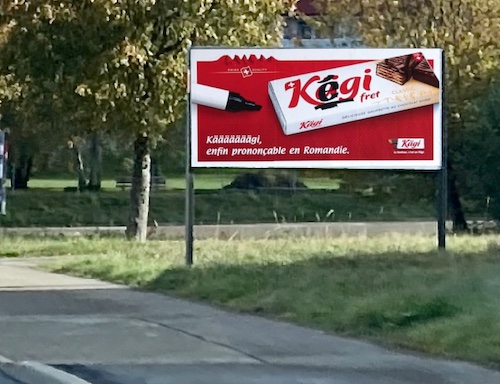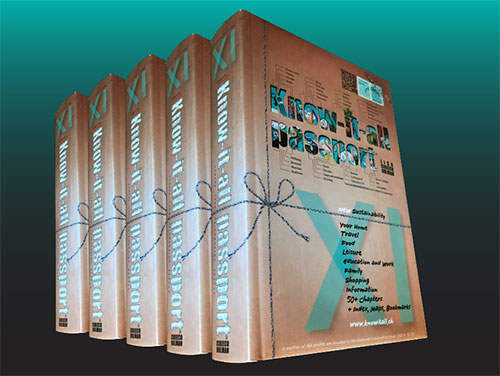
Suisse romande poster for Kägi fret chocolate bisuits... corrected to read Kégi so the Suisse Romands can pronounce it!
There are several expressions that don't translate literally. It is fun to learn how to speak like a local. Do you know of any other phrases that we could show our readers? If so, please get in touch. Make sure to check out part one and part two of these articles.
Deçu en bien
Meaning "pleasantly surprised"
Literal translation: disappointed in good
The expectation of a bad or mediocre result, thus the opposite of disappointed. It is a confusing one but often used in Suisse Romandie.
Used in a sentence: Je suis deçu en bien après avoir finalement gouter la recette. Je ne m'y attendais pas que ça sera si delicieux car il n'avait par l'air. (I'm disappointed in a good way after finally tasting the recipe. I didn't expect it to be so delicious because it didn't look like it.)
Ce n’est pas terrible
The French expression ce n’est pas terrible is a weird one, because the word terrible can mean either “terrible” or “terrific.” When someone says c’est terrible! they might mean “it’s great!” or “it’s awful!”
In the negative, ironically, terrible is usually positive, so ce n’est pas terrible (or, more familiarly, c’est pas terrible) most commonly means “it’s not so great, it’s nothing special.”
Ça va pas le chalet?
Meaning "Are you crazy?"
Literal translation: isn't it alright in the mountain house?
Other similar expressions in French are "il n’a pas la lumière allumée à tous les étages” means “not every floor is lit."
French slang or familiar colloquiums you might not learn at school:
- coûter un saladier: costs a fortune
- touiller: to stir
- casser du sucre sur le dos de quelqu’un: to talk about someone behind their back
- casse-toi!: get out!
- on se tire: Let’s get out of here
- se donne un mal de chien: to bend over backwards
- se faire rouler: to get swindled, to be had
- se payer la tête de quelqu’un: to make fun of someone
- un sou est un sou: every penny counts
- on ne peut pas avoir le beurre et l’argent du beurre: you can’t have your cake and eat it too.
- rester bouche bée: to be open-mouthed, gob-smacked
- rouler une pelle à quelqu’un: to French kiss someone
- en mettre un sacré coup: to really go at it, work hard
- être au bout du rouleau: to be exhausted
Genevese slang:
- L’avale-royaume: a glutton
- Baguenauder (se): to stroll
- Barjaquer: to chit chat
- Le bisule: the little one
- Bonnard: good, cool
- Les bouëllées: loud shrieks
- Le caqueux: embarrassed
- Les cavilles: silly things
- Chevrer (faire): to anger someone
- Le clopet: a nap
- Foutimasser: to make
- La grolle: shoe
- La peuffe: dust
- Plucher: to peel
- Le taborniau: the idiot
- Le petzeu: peasant
- Le porreau: the leek
- Le pouais: the dirty one
- La tralée: a big quantity
Le Petit Larousse made some new entries in the 2015 edition:
"Etre déçu en bien" and "Ça va, le chalet?" were new entries into Le Petit Larousse dictionary. Check out the article here.
Other words that made that edition:
Ne «psychotez» pas si votre ordinateur «bogue» mais conservez votre «zénitude» en «vapotant» avec cet objet «iconique», vraie «tuerie» pour les accros. (Dictionary - Don't "get psychotic" if your computer "bugs", but keep your "zenitude" by "vaping" with this "iconic" object, a real "killing" for addicts.)
Excerpt from Know-it-all passport® 11th edition, pages 461-463.
![]()
Click here to read part 1.
![]() Click here to read part 2.
Click here to read part 2.
 Make sure to buy your copy of Know-it-all passport to get lots more local tips, info, and recommendations. The 11th edition is sold at the following locations, click here.
Make sure to buy your copy of Know-it-all passport to get lots more local tips, info, and recommendations. The 11th edition is sold at the following locations, click here.






